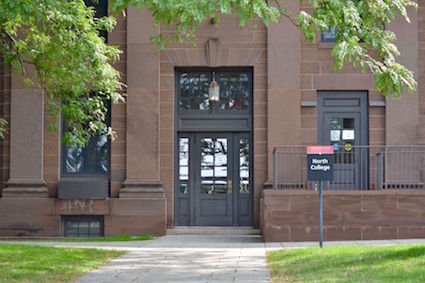
Following the creation of the College of Education Studies and the linked Education Studies major in April, student interest in studying education has skyrocketed.
Previously, the University only offered Education Studies as a minor. This semester, however, there are already an estimated 25 majors and 60 to 65 minors, according to Co-Chair of the College of Education Studies and Associate Professor of Psychology Professor Anna Shusterman.
“One of the goals in establishing the College was to create a collective, or a community of people—faculty, students, others, staff—to connect,” Shusterman said. “And so I feel like we’ve been able, to a large extent, to fulfill that goal, even though we don’t have a physical space together.”
Billy Bannan ’21, who began taking Education Studies classes in her first year at the University, said she declared the major as soon as it became available.
“This new major has really helped me cultivate my passions in the field of education, and has definitely shaped my future plans,” Bannan said.
A cohort of 13 seniors declared the Education Studies major this fall and they will be the first to graduate with this field of study.
“It’s been really exciting to be on the forefront of the development of the major, and I was directly involved with that process during the Fall of 2019, when I was a peer advisor for the department,” Bannon said. “We all have very different backgrounds coming into this intersectional field, which has been exciting to explore in the Senior Education Seminar.”
Shusterman, who teaches the Senior Education Seminar, said she collaborated with the students to decide a lot of the class’s curriculum.
“We really are co-creating what they want to learn, where the gaps are,” Shusterman said. “They started out with the minor…so now we’re kind of using the seminar to backfill areas of Education Studies that really we want everyone to know about before they leave with a Wesleyan major.”
Claudia Ferrara ’21, another member of the seminar, said this course has been a very powerful and collaborative experience so far.
“We kind of made the seminar what we wanted it to be,” Ferrara said. “[Professor Shusterman] asked us what we wanted this class to be and what we wanted to get out of it, and from that we created a curriculum with materials that we were interested in and topics that we were interested in. It was the first time I’ve had that experience at Wesleyan, so that’s been really incredible.”
In conjunction with the senior seminar, the College is spearheading a new colloquium speaker series. This year, the series focuses on issues of race and equity in education, according to Associate Professor of the Practice in Education Studies Amy Grillo.
“We’re very interested in the role that education plays in society of how education connects to larger social issues,” Grillo said.
She added that the colloquium has also been a great way to connect the University with the larger education community while examining the field through a new lens.
Another key element of the College of Education Studies is the practicum, which is traditionally when education students spend time observing local classrooms for a semester. With the pandemic and many schools shifting to remote learning, however, the practicum is currently running online.
“The practicum has been really invaluable to understanding what classroom structures look like and how that changes online,” Ferrara, who is spending her practicum observing a fourth grade classroom in Meriden, said. “I have gained a significant appreciation for early education teachers during this time and their role in all of this….It’s been really cool to go into the classroom and see how these teachers are adapting, because it’s really hard.”
Ferrara also said she’s seen significant reduction in student engagement during remote learning, which makes it harder for students to pay attention overall.
“It’s harder to control, it’s a very loose environment…what makes me the most anxious with all of this shift COVID is children’s access to play and to communicate and to create interpersonal relationships,” Ferrara said. “It’s really isolating.”
While the practicum is being conducted remotely this fall, Grillo said there has still been plenty of opportunity for valuable observation.
“The types of skills [the Education Studies students are] usually learning—like close observation of classroom dynamics and what people are saying and doing—is entirely different when talking about squares on a screen,” Grillo said. “They are learning a lot about the dynamics of online learning and teaching that I didn’t think we’d be able to see so quickly. So it’s been really fascinating. The practicum experiences are different but just as illuminating and just as worthy of study as the in person ones so far.”
The pandemic has also helped Education Studies students see an entirely new side to education in this country.
“When I decided I wanted to be a teacher, I definitely didn’t envision that to mean staring at a computer screen full of children’s faces,” Education Studies Minor Safa Figal ’21 said. “On the plus side though, this pandemic has unearthed and exacerbated many inequities and issues that have always plagued education in America, so it’s encouraging and exciting to see people starting to realize the seriousness and importance of these concerns.”
Ferrara echoed Figal’s sentiments.
“My eyes are open, my thoughts are expanded, my conceptualizations are challenged, and now I’m able to apply all of that to real life, which is something that is really rewarding, and I don’t think I expected to come out a major,” Ferrara said.
If anything, the shift to remote learning and the experiences the Education Studies students have been able to have in this new setting have reinforced the value of teachers in American society.
“Teachers make the world go round,” Ferrara added. “It’s been really awesome to be a part of a major in a space which uplifts teacher voices so extensively.”
Rachel Wachman can be reached at rwachman@wesleyan.edu


Leave a Reply